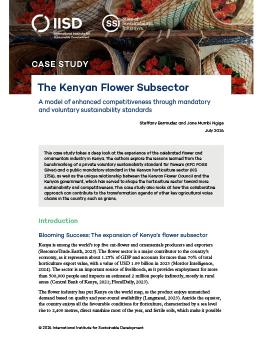
The Kenyan Flower Subsector
A model of enhanced competitiveness through mandatory and voluntary sustainability standards
This case study explores how Kenya's experiences aligning public and private standards in the flower industry can help transform sustainability efforts in agricultural value chains.
Kenya's flower industry put the country on the map. Today, the sector is a vital part of its economy, accounting for 1.25% of GDP and employing more than 500,000 Kenyans.
With separate public and private sustainability standards operating in the same industry, the Kenyan government recognized the need to reduce duplication through collaboration and alignment of both standards.
Their efforts have made a huge difference to producers and exporters by easing procedures and reducing the costs and administrative burden of complying with different schemes.
This case study focuses on lessons learned from aligning public and private standards and the role that partnerships between government and industry actors play in facilitating industry development and sustainability.
We spoke with industry actors to understand how benchmarking between mandatory public and voluntary private standards contributed to success, looking at their motivations, factors behind the process, benefits for value chain actors, and implementation challenges. From these lessons, we seek to demonstrate how this approach can transform other agricultural value chains.
Participating experts
You might also be interested in
Women Turning the Table on Food Loss and Waste in Kenya
A group of changemakers led a movement to tackle food loss and waste in Kenya. IISD experts have been working closely with local women leaders to make change happen.
New tool empowers businesses to make food systems sustainable
The Responsible Agricultural Investment (RAI) Tool for Agribusiness helps business leaders put principles into practice in the drive to improve sustainability in agrifood systems.
The Responsible Agricultural Investment Tool for Agribusiness
This tool aims to support agribusinesses in aligning their practices, procedures, and operations with principles of responsible investment in agriculture and food systems.
Rethinking Investment Treaties
International investment treaties and their investor–state dispute settlement (ISDS) system are facing growing scrutiny. But what would an alternative system—one fit for the challenges of the 21st century—look like?
